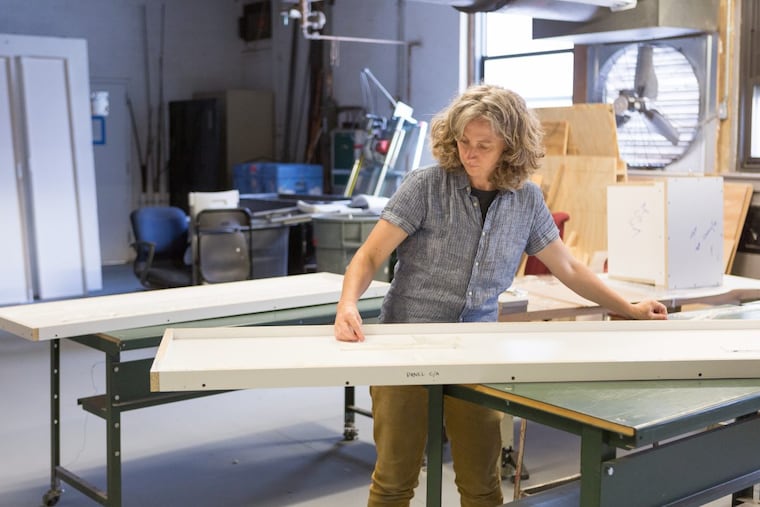Philly just lost one of its three monuments to women. Let's build five more | Conrad Benner
Although the city of Philadelphia is home to over 1,500 public sculptures, there are only two that celebrate the life of a real, historical woman.

Last weekend, Philadelphia tore down a monument.
If They Should Ask, which stood in Rittenhouse Square and was designed by artist Sharon Hayes, was created for the express purpose of calling attention to Philadelphia's lack of female monuments. Of the more than 1,500 public sculptures in Philadelphia, only three – including Hayes' piece – depict real, historical women.
Hayes' monument was a collection of pedestals piled together stirringly in the middle of Rittenhouse Square. As you approached it, you'd see that the pedestals were etched with the names of dozens of women. And after reading an accompanying plaque, you'd realize that the names were of women vital to the life, art, activism, politics and culture of Philadelphia (and beyond) from the mid-1600s to the present day.
The monument stood for nearly two months as part of Monument Lab, the citywide public art and history exhibition produced in partnership with Mural Arts Philadelphia that prompted Philadelphians to wonder what kinds of monuments are appropriate for the city right now. (Full disclosure: I am on the Monument Lab curatorial team.)
Like all the artwork of Monument Lab, If They Should Ask was always destined to be a temporary installment. But Hayes' and a few other artists' pieces came down a couple of weeks early to accommodate the setting up of holiday decorations. Hayes hopes that it will leave the whole city eager and empowered to begin to address centuries of patriarchal monument making.
"If They Should Ask proposes that the persistent and aggressive exclusion of women from this form of public recognition perpetuates historical misunderstandings and reproduces inequality in the city's economic, social, political, and cultural spheres," Hayes wrote in her artist statement.
While Hayes' monument is now gone from the monument landscape of Philadelphia, I hope its absence can inspire the making of monuments to the countless historical women who deserve to be honored and remembered in our city's public spaces. Here are five women the city should consider honoring:
Harriet Forten Purvis (1810–75): Women's rights and anti-slavery activist and a station master for the Underground Railroad. Purvis joined many of the city's leading women abolitionists to form the Philadelphia Female Anti-Slavery Society in 1833. After the 13th Amendment was passed, she continued her efforts to improve the rights of African Americans, fighting against segregation and for the right for blacks to vote.
Lucretia Mott (1793–1880): Quaker, abolitionist, women's rights activist, and social reformer. Mott helped to write the Declaration of Sentiments during the 1848 Seneca Falls Convention, a document signed in 1848 by 68 women and 32 men at the first women's rights convention to be organized by women.
Marian Anderson (1897-1993): One of the most celebrated singers of the 20th century. Anderson became the first African American to perform as a member of the New York Metropolitan Opera. She spent much of her life breaking down barriers for African American performers, ultimately being honored with the Presidential Medal of Freedom by President John F. Kennedy.
Gloria Casarez (1971–2014): American civil rights leader and LGBT activist. Casarez was named one of the "100 Most Influential Leaders of the New Millennium" in 1999 by Out Magazine for her work as program coordinator for the LGBT Center at the University of Pennsylvania, where she developed innovative student-mentorship and programming for LGBT students of color, transgender, and queer students on campus. She became the City of Philadelphia's first director of LGBT affairs in 2008. During her tenure, Philadelphia adopted the broadest LGBT rights protection in the nation and ranked as the top city nationwide for LGBT equality.
Jaci Adams (1957-2014): HIV/AIDS and transgender health advocate, and a longtime leader in the Philadelphia LGBTQ community. Adams served on many boards and commissions, but was best known for helping and counseling countless people individually. She was a founding member of the Temple University Community Advisory Board and founded the People With Hope Trans Conference. She served as a member of the Philadelphia Police Liaison Committee, acted as an adviser to the City of Philadelphia Office of LGBT Affairs, worked on the board of the LGBT Elder Initiative and volunteered with the Philadelphia District Attorney's Youth Aid Panel and the Delaware Valley Legacy Fund.
These, of course, are just a few of the women who've helped to build the world we live in today. Now is the time to address the monuments in our public spaces. And now is the time to rightly honor and remember the women who've played an invaluable role in shaping our city and our history.
Conrad Benner is a photographer, podcaster, curator, and founder of StreetsDept.com, a photo blog that discovers art on the streets of Philadelphia. Follow him on Twitter @StreetsDept.